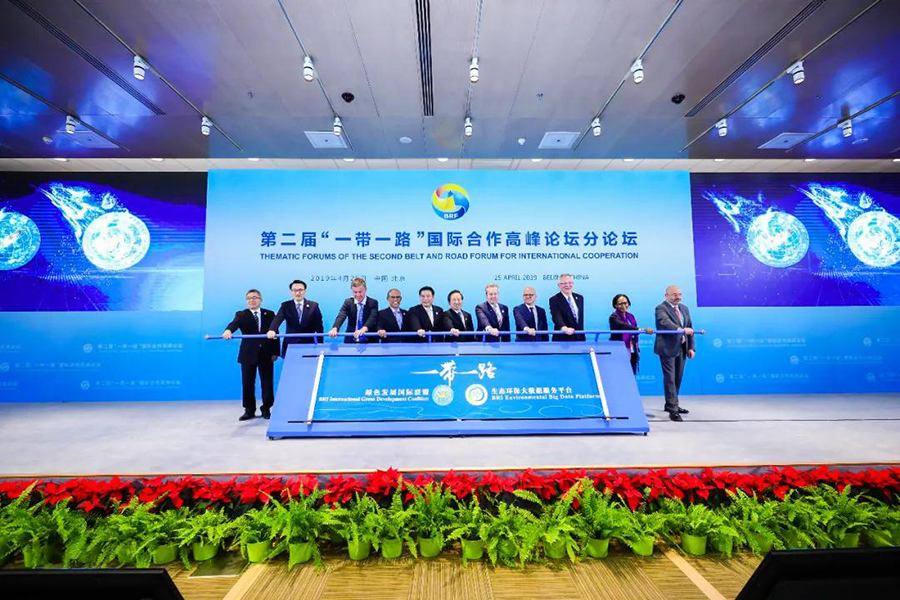
As the pressures of climate change continue to mount, there is an urgent need for a form of growth that embraces conservation. This is particularly important for countries along the Belt and Road routes.
Most countries participating in the Belt and Road Initiative are developing countries and emerging economies, and they still rely on extensive economic growth and suffer from the resultant severe air and water pollution. Their overall carbon emissions have accounted for more than 60 percent of the global total. Sixty percent of the countries most vulnerable to climate change are participating in the Belt and Road Initiative. These countries have high population densities, high exposure to climate-related disasters, weak infrastructure and governance and lack the capability to mitigate and adapt to the effects of climate change.
To address this situation, the construction of the Belt and Road Initiative needs not only effective environmental pollution treatment and prevention measures, but also green financing instruments that change the incentive mechanism for resource allocation at the very beginning of financing and investment.
In 2017, the Chinese government issued its Guidance on Promoting Green Belt and Road and Belt and Road Ecological and Environmental Cooperation Plan. According to the two official documents, in three to five years China will establish a pragmatic and efficient system for environmental cooperation and exchanges, including support and service platforms, and formulate and implement a series of environmental risk prevention policies and measures. It will also carry out a number of important ecological projects that produce the desired results in five to 10 years. In the keynote speech at the opening of Second Belt and Road Forum for International Cooperation in April 2019, President Xi Jinping stressed that China will adhere to openness, environmental-friendliness and integrity when advancing the Belt and Road Initiative and build infrastructure characterized by its high quality, sustainability, risk resilience, reasonable pricing, inclusiveness and accessibility.
China's efforts have injected new impetus into the implementation of the United Nations 2030 Agenda for Sustainable Development and brought new development opportunities to countries participating in the Belt and Road Initiative. Till now, the participating countries and international organizations have signed nearly 50 multilateral and bilateral agreements on ecological and environmental cooperation. In January 2018, the Five-Year Plan of Action on Lancang-Mekong Cooperation (2018-22) was released to address environmental issues along the river and to achieve the overall goals of environmental protection and sustainable development in the region.The Belt and Road Initiative International Green Development Coalition (BRIGC) was established in April 2019, after the second Belt and Road Forum, to promote international consensus, understanding, cooperation and concerted actions to realize green development along the Belt and Road routes, and to facilitate the countries participating in the Belt and Road Initiative realizing the sustainable development goals. Accordingly, over 140 Chinese and international organizations have joined the Coalition, and positive progress has been made in the areas of research and capacity building.China has also launched the Belt and Road Ecological Big Data Service Platform, the Green Silk Road Envoy Programme and the Belt and Road South-South Cooperation initiative on climate change.

Whether Belt and Road investment can be matched with the vision of low-carbon development path of the Belt and Road Initiative depends largely on whether low-carbon projects can be promoted through stricter standards for overseas financing.
At the end of November 2018, Green Investment Principles (GIP) for the Belt and Road, a set of principles for greening Belt and Road investments, was officially launched in London, strongly supported by the governments of China and United Kingdom and global financial communities. GIP is based on the United Nations Responsible Investment Initiative (UN PRI), and aims to incorporate low-carbon and sustainable development issues into the Belt and Road Initiative. It seeks to strengthen the environmental and social risk management of investment projects, ensure investment projects are environmentally friendly, incorporate climate adaptation and social inclusion, and support the implementation of the UN Sustainable Development Goals and the Paris Agreement by expanding green investment and reducing high-carbon and polluting investment. As of March 2020, 37 large global financial institutions had signed the GIP, and 11 organizations had agreed to provide official support. The contracted financial institutions promise to uphold the concept of green finance and social responsibility, use their broad international vision and extensive international network to connect domestic and foreign capital markets, and to become practitioners, promoters and leaders of Belt and Road greening investment.
Currently, the Belt and Road Initiative has shown great resilience against the backdrop of the pandemic's major impact on the global economy.
In terms of the information provided by State Councilor and Foreign Minister Wang Yi in a news conference on May 24, 2020, despite the outbreak of COVID-19, in the first quarter of this year, China's Belt and Road Initiative investment grew by 11.7 percent and the trade volume increased by 3.2 percent. There is great potential for the development of environmental standards for the construction of green infrastructure, as well as the research and development, demonstration and application of green technologies by China and Belt and Road countries. The decisions around green infrastructure in the Belt and Road Initiative countries in the next decade will therefore make great contributions in the global fight against climate change. If this cooperation potential can be translated into real investments, then after the outbreak, the green development of the Belt and Road will be of great significance to global economic recovery and achieving the global sustainable development goals.
Copyright © 2020 BRI International Green Development Coalition. All rights reserved.
Address: No.5 Houyingfang Hutong, Xicheng District, Beijing 100035, China
Postcode: 100035
Fax: (86)10-82200539
E-mail: secretariat@brigc.net